Discover a simple & repeatable system that empowers you to create beautiful orchestrations with clarity & confidence.
Uncover the workflow and techniques used by professional MIDI orchestrators to enhance your musical ideas and bring your music to life, using your sample libraries.
"How on earth did they DO that?"
I remember that exact moment like it was yesterday. I was listening to one of my favourite orchestral soundtracks at the time (Super Mario Galaxy series) on the way to high school, and there was a particular passage that struck me.
The strings were lush and soaring, there was an immediate warmth in the midrange, the overall arrangement was supported in the low end, and it really set the stage for the melody to shine through.
I knew that the melody was the most important element in the piece, and I could figure out the chord progressions by ear, but the orchestration made me FEEL something, and gave me those butterflies that I now chase every time I listen to new music.
That's where my addiction to orchestration began, and my lifelong passion for making my music come to life through proper instrumentation developed.
Don't get me wrong, this involved trial and error.
The world of orchestration and choosing the right instruments to create the appropriate textures/atmospheres for your music can be daunting, and I'm here to tell you that it's absolutely not your fault.
There are a million ways to learn how to orchestrate, and most composers have no idea where to start!
With the music industry growing and expanding day by day, people LOVE sharing their opinions; many of which can be helpful, but may also lead you down a long, difficult path through conflicting information and inflated egos.
Some of the most common recommendations include:
- You must go to school to learn orchestration!
- Purchase the right sample libraries, and your orchestrations will immediately improve.
- You have to be able to read music, to truly see what's going on in the instrumentation!
- Score study is the absolute best way to learn orchestration.
- Transcribing every day is a must!
And I'm here to tell you that none of these are essential to learning how to orchestrate with your virtual instruments!
Sure, having access to traditional education, solid sample libraries to begin with, and the ability to read notation and transcribe can be helpful, but I've found a much simpler way; one that I've been using since day one.
And that's CRITICAL LISTENING.
To be completely honest, most people neglect the power of critical listening, and they end up reading numerous orchestration textbooks, watching way too many YouTube videos, and second guess themselves every time they choose a certain instrument for their arrangement.
In reality, all it takes is a basic understanding of the orchestra, a willingness to train your ears to pick up certain textures and timbres, a set of workhorse sample libraries, and consistent practice.
This is exactly what I've done from the very beginning, and it's allowed me to develop the confidence to orchestrate effectively, no matter the context or situation.
In fact, my clients hire me specifically to orchestrate their songs and pieces, using sample libraries to bring the best out of their musical ideas.
Learning how to orchestrate has opened so many doors for me - including creating arrangements for Tina Guo, Anne-Kathrin Dern, Steven Melin, and Jonathan and Friends.
All composers can write music - but many can't orchestrate.
"So what does it take to create incredible virtual orchestrations?"
Because the art of virtual orchestration is so vast, and easily overwhelming, most composers give up when it's time to add instruments to their pieces. But I can break it down into several core components that we MUST consider for effective orchestrations:
- A fundamental understanding of the orchestra and its core components
- How each instrument sounds and functions, as well as its limitations
- How different instruments combine to create unique timbres, textures, and emotions
- Applying our orchestration knowledge to the virtual world, and learning our sample libraries inside and out
- A solid DAW and programming workflow for working with efficiency and ease
- Polishing your tracks through mixing and mastering
With all these components in place, it's absolutely possible to orchestrate your music using your virtual instruments, knowing that you're making the right choices every time when it comes to choosing and applying your instruments.
As I've been orchestrating for myself and others, I've developed and refined my workflow over the years, and I want to share my process with you, because I know how effective proper orchestration can be for your music.
The coolest thing is: arranging used to be something I dreaded the most. Now, it's the process I most look forward to. And if you put into practice what I'm about to show you, it'll quickly become one of, if not your favourite processes as well.
I'm so excited and proud to share: Virtual Orchestration Mastery.
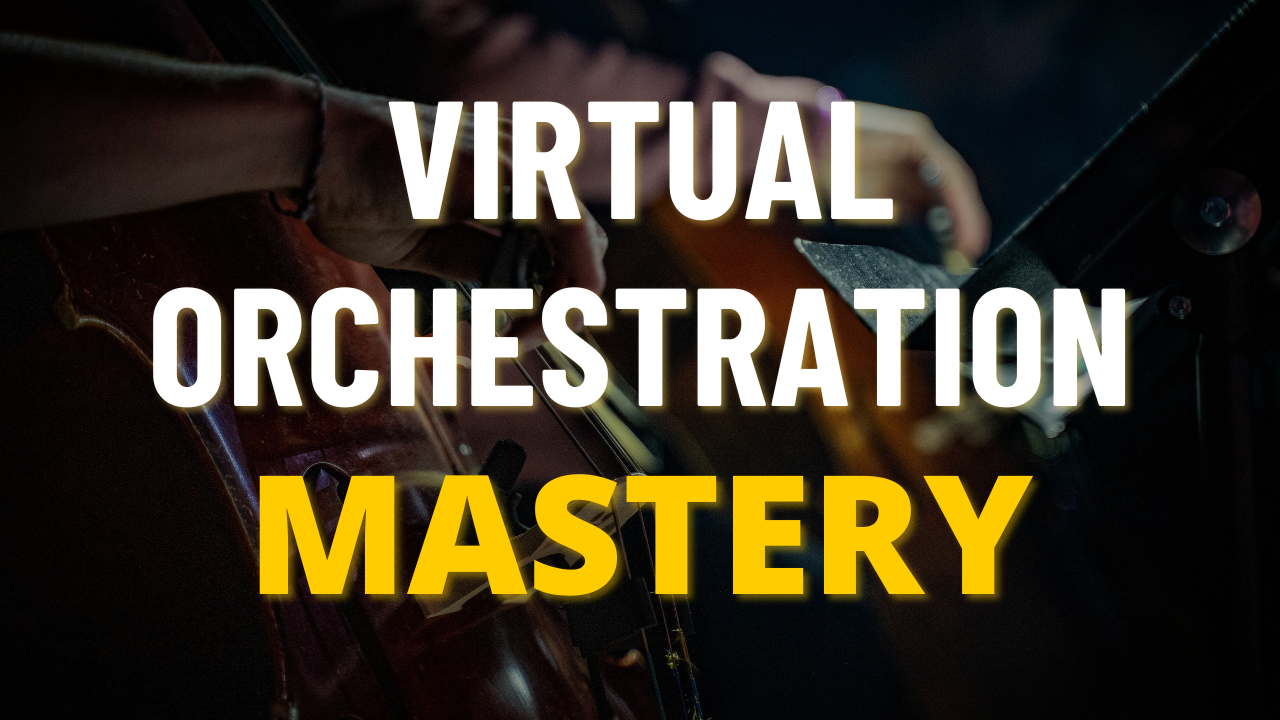
An comprehensive, simple approach to learning the virtual orchestra and using it effectively in your music, to truly bring it to life.
"Virtual Orchestration Mastery has been a fantastic learning experience. Though this course is about mastering the virtual orchestra, Christopher's teaching is very focused on musicality.
Through the use of singing, transcribing by ear and score analysis (with multiple examples), Christopher helps us understand the essence of orchestral writing: establishing moods and emotions to enhance the composition.
The course also provided a lot of practical tips on putting all the theory into practice in the DAW with a simple yet powerful 5 steps orchestration process which ensures musical clarity: you begin with the most important parts and then move to the more detailed elements before polishing the piece for publishing.
Watching Christopher orchestrate his final piece allowed me to understand that perfection should not be sought immediately, but rather built progressively while staying true to the musical spirit of the composition. Mistakes and trial-and-error during the arrangement are a normal part of the creative process and should not discourage or block the composer!
Christopher has a particularly honest and enlightened perspective on his compositions and is therefore able to explain in detail his choices and sometimes detours, always justifying them by a desire to strengthen the musicality of the work. The result is impressive. Thank you."
- Thibault L.M. (composer)
Virtual Orchestration Mastery will help you:
Get Your Ideas Down Quickly & Efficiently
After you've written your music, sketching is essential. You'll know exactly what instruments to use to give you an overall impression of how your orchestration will pan out.
Produce Realistic Mockups
You'll understand what elements go into creating a sense of realism, and exactly how to achieve it.
Orchestrate in Various Styles
After learning the basics of orchestration, you'll understand not only how to use the instruments, but also in a variety of scoring situations.
Master Your Sample Libraries
Rather than becoming overwhelmed, you'll know exactly what components are actually necessary in your libraries, and how to get the best out of them musically.
Create Arrangements That Truly Move Your Audience
Music is all about feeling and expression, and so you'll have the full command over the orchestra so you can make your music breathe and flow, creating a timeless sound.
"I am a classical guitarist graduated from conservatories in Mexico, Spain and France. Although I am retired from concert halls, I dedicate my retirement time to composition and orchestration through new technologies, which when applied to music education represent another of my passions.
Internalizing the strict technique of professional academic music studies mediated by technology produces a culture shock that is difficult to assimilate, but with the courses that young teachers like Christopher share with us, they represent a real interface that allows us to approach academic techniques from a different perspective: the technological modernity and a high content of artistic creativity.
For this and much more, I highly recommend all of Chris' courses and especially Virtual Orchestration Mastery, which, for me, is the grand finale of the series.
On behalf of all of us who continue to learn, thank you very much Chris."
- Dr. Santiago Chío Zulaica (composer, guitarist)
Virtual Orchestration Mastery is structured into 7 modules:
"Christopher's ability to break down complex and often difficult concepts is a rare gift. Virtual Orchestration Mastery is one of those courses where you can follow along and not get overwhelmed by too much disjointed information.
It's clear and structured in a way that is really beneficial and makes grasping the material easier. When I started learning composition and how to compose music for an orchestra, I spent many hours trying to piece together different videos and tutorials.
A course like Virtual Orchestration Mastery sets you on a focused path and rarely will you feel like you're drifting. If that was to happen you'll find that the community (as well as Christopher's) feedback will encourage you and keep you on course.
It is easy to recommend this online course due to the fact that Christopher is highly professional, very responsive and compiled a great and comprehensive study of virtual orchestration."
- Heino B. (composer)
Homework and next steps included!
All of the content is presented through video format for the best learning experience. In addition, you'll also be provided with a written summary of each topic below the corresponding video.
Throughout the course, I've laid out 'next steps', so you can follow along with me, step-by-step, and ensure that you're progressing without any hiccups!
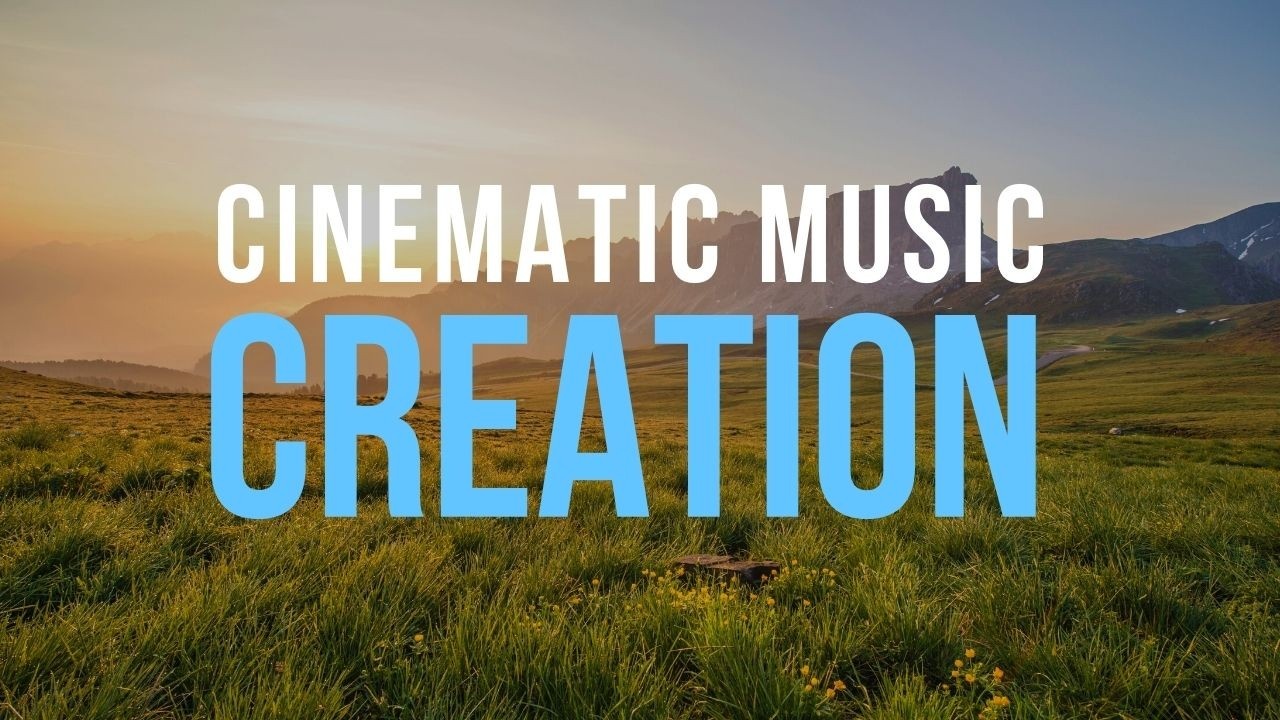
Lifetime 40% loyalty discount to Cinematic Music Creation!
As a student of Virtual Orchestration Mastery, you'll have access to a lifetime 40% loyalty discount to my flagship composing system Cinematic Music Creation: an end-to-end program perfect for the aspiring composer looking to create professional-quality orchestral music from start to finish.
CMC also comes with exclusive EDU discounts to sample libraries + custom track feedback!
"If you are new to virtual orchestration, this class is for you.
Chris does an excellent job providing an overview of virtual orchestration and the fundamentals of orchestration. He also lays a good foundation on how to use DAWs and sample libraries so that you can quickly get started. He provides multiple examples on how to use these tools to write in different orchestral genres.
Chris finally takes you step-by-step walking you though one of his own compositions explaining all of the decisions you’ll need to make in order to compose, arrange, mix and master your own compositions.
I wish that this course would have been available when I was first starting on my journey in virtual orchestration; highly recommended."
- Wayne B. (composer)
Virtual Orchestration Mastery is for you if:
- You understand how powerful the orchestra can be, and truly want to bring your musical ideas to life through proper instrumentation and production
- You're frustrated with your current progress, and want a simple system to follow so you can take control of your virtual orchestrations once and for all
- You're tired of reading countless textbooks, watching conflicting videos, visiting multiple forums, and feeling like you have no idea where to start
- You desire simplicity and effective results over maximum tweakability and control
- You're EXCITED not just about orchestration, but how to get the best out of your sample libraries to achieve what you hear in your head
This course is NOT for you if:
- You prioritize absolute control and tweaking options over fast & efficient musical results. Some composers prefer to use tools that give them absolutely everything - I don't agree with this philosophy, and therefore don't use those libraries and techniques to achieve my results.
- You're expecting an encyclopedia of tips and tricks for utmost realism. While realism is an important factor in our mockups, this course focuses on the core techniques and philosophies that create arrangements that move our audience and take them on a journey, rather than trying to tweak every element until we're satisfied with how real it sounds.
- You're looking for a notation-based course. This course takes place primarily through slide presentations (for the theoretical aspects) and in the DAW (for the practical aspects). If you need to follow along with a notation platform (Dorico, Finale, Sibelius, MuseScore, Noteflight, etc.), there are wonderful resources for those elsewhere.
- You're expecting results overnight. Learning the ins and outs of orchestration is a lifelong pursuit, and so if you're expecting to be able to orchestrate like John Williams immediately after watching this course, this isn't for you. However, if you're willing to take this information and put it into practice consistently, you'll start to see steady results that will serve you well in the future.
What students are saying...
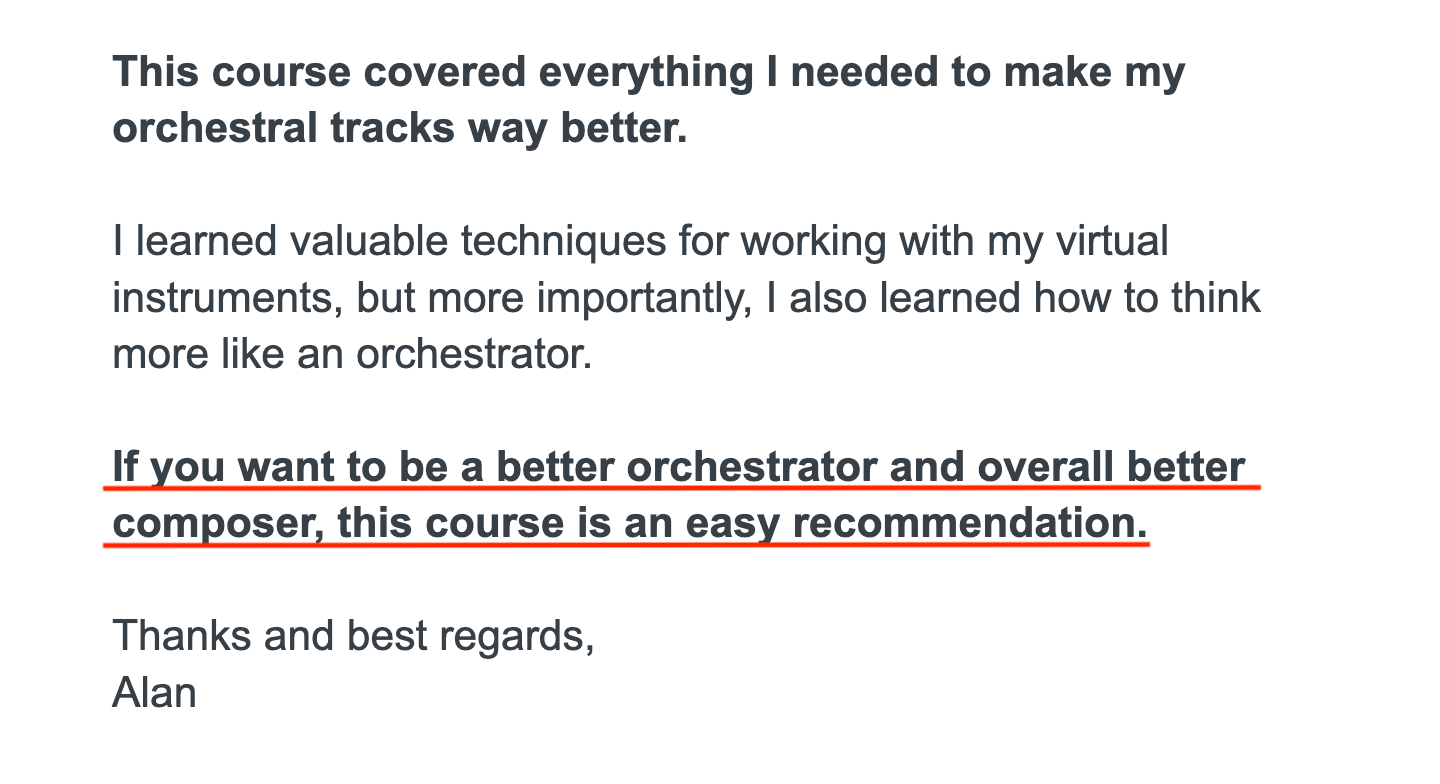






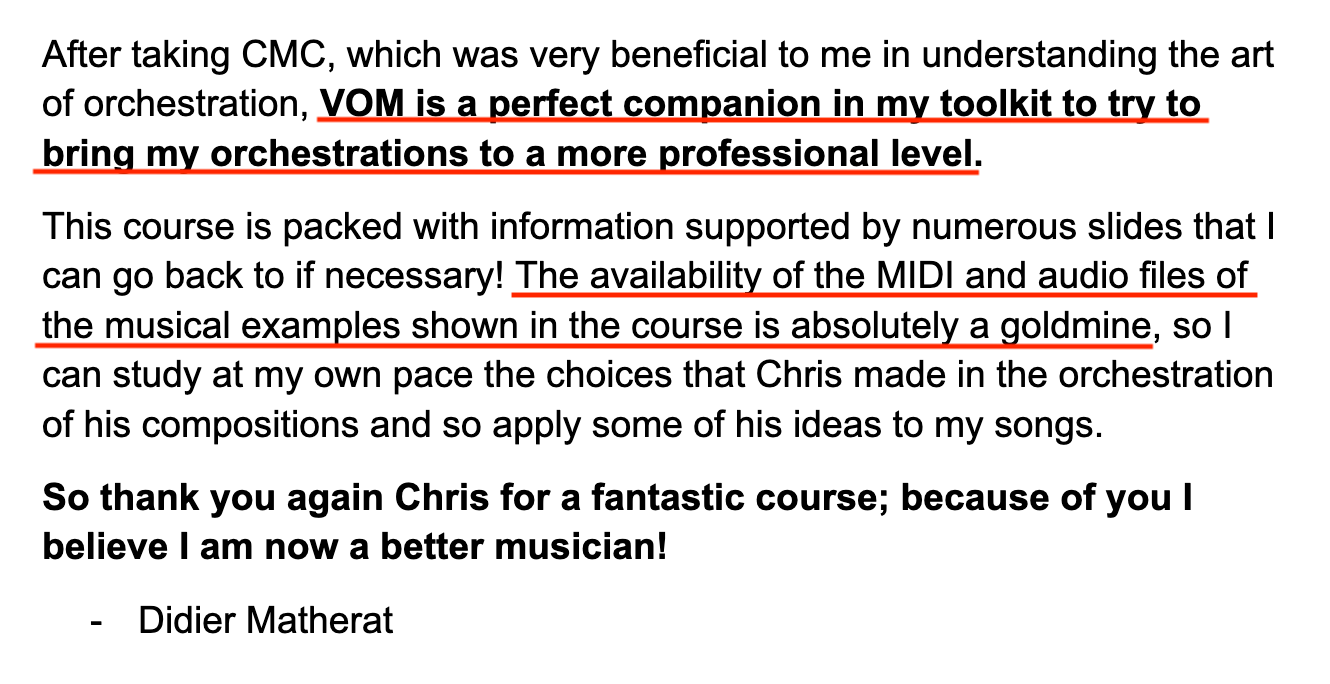
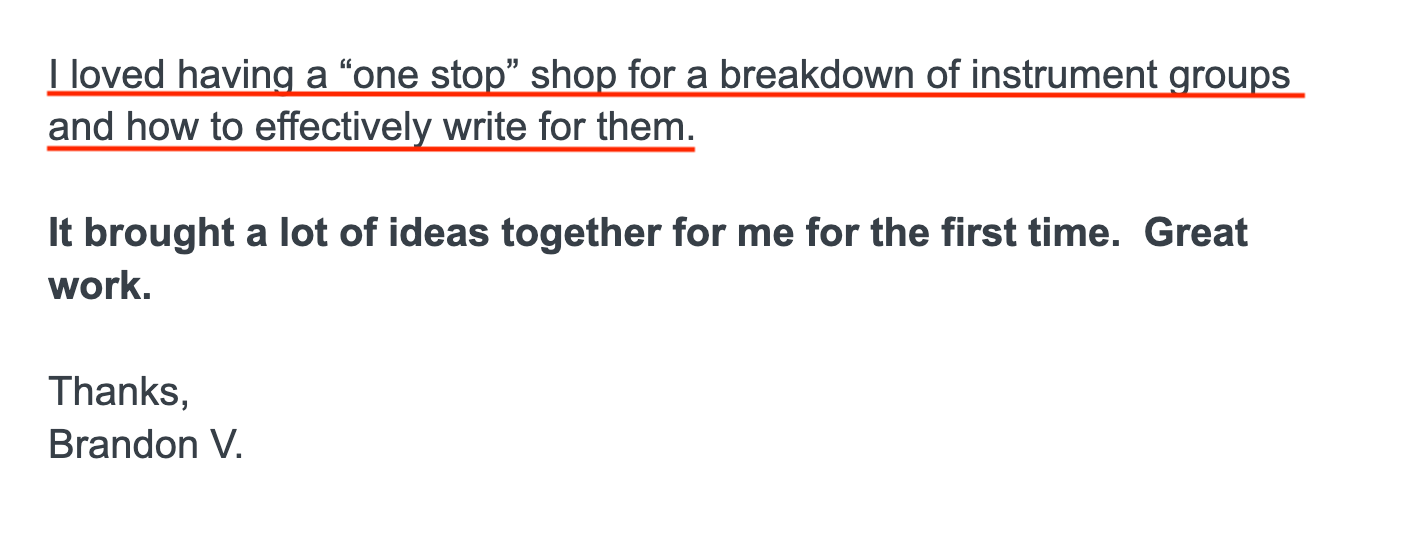
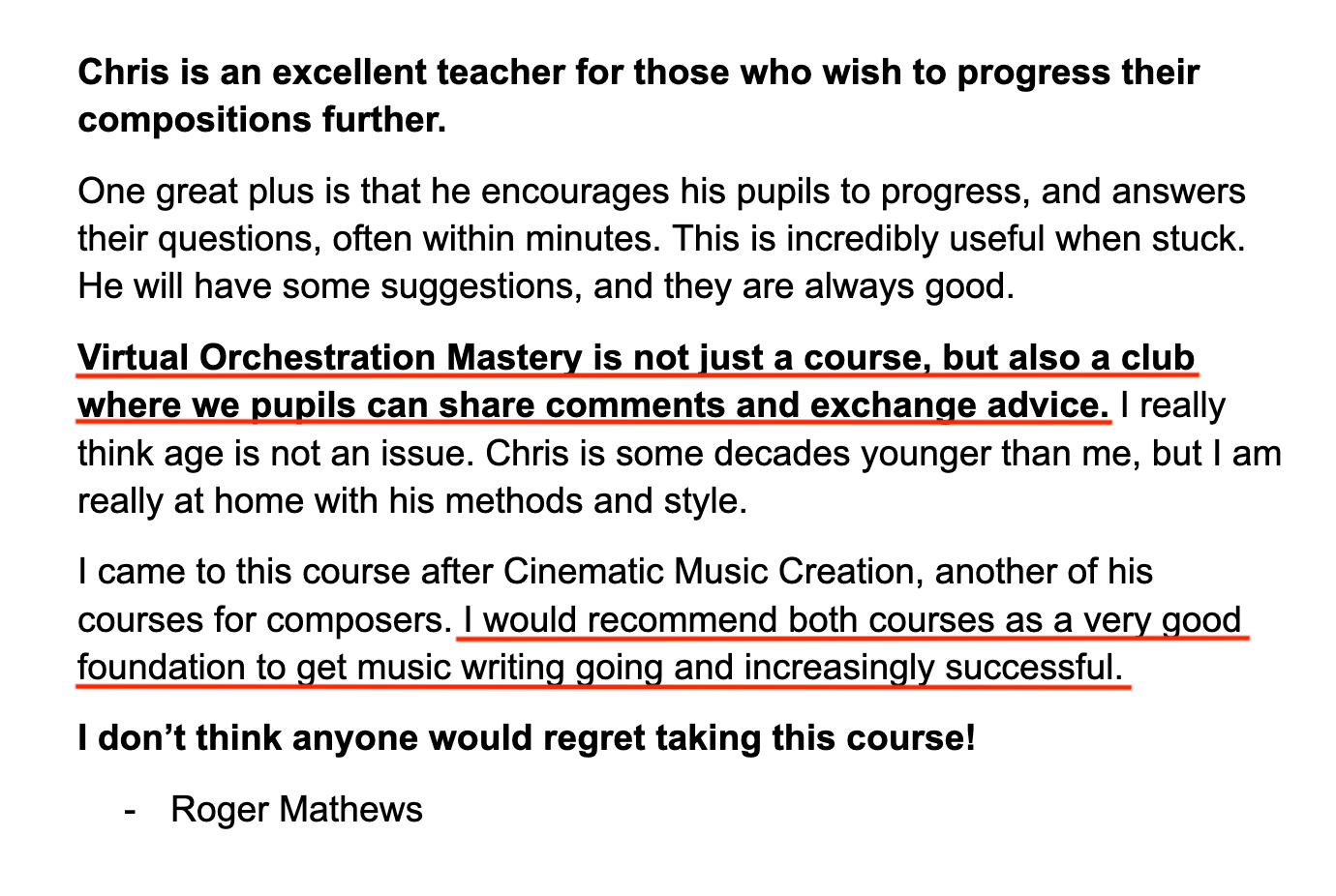

"Virtual Orchestration Mastery has become a very valuable learning resource for me. It surely made this very complex topic much more digestible and gave me some very useful guidelines to follow, and look at the bigger picture of what orchestration is all about. This was not the case for me before taking this course - I feel much more comfortable about orchestrating my tracks now, and have a much better handle on how to go about building my orchestral compositions.
Christopher offers a lot of very useful tips that helped me develop a clear methodology enabling me to apply a logical process of thinking, when it comes to deciding on what instruments to use for the various parts of my orchestral composition, and how the various instruments blend with each other to create new, rich, and musically attractive timbres.
I'm also getting much better at analyzing orchestrations when I listen to various styles of soundtracks or orchestral music in general, knowing what to listen to, and figuring out what's happening in the composition! This is a very valuable skill that continues to improve with experience, and many of the orchestration tips and guidelines covered that in this course.
I highly recommend Virtual Orchestration Mastery for beginner and intermediate-level composers that want to begin learning, or enhance their knowledge about orchestration in general, and especially virtual orchestration."
- Tarek Algosaibi (composer)
So how much does Virtual Orchestration Mastery cost?
Well, if you wanted to study music at a college or university, a course on theory or orchestration could cost you upwards of $4,000 for a single semester. Over the course of a 4-year degree, that can bring you up to nearly $40,000 (which is what I paid for my piano performance degree)!
Join Virtual Orchestration Mastery today!
Click the button to get instant access for just one payment of $397!
GET STARTED NOW"Virtual Orchestration Mastery is yet another of Chris Siu’s wonderful courses in the realm of cinematic music.
Chris’ pedagogical skills, along with his omnipresent enthusiasm, will enable any musician of any skill level the opportunity to master the mundane yet vitally important domain of creating great sounding orchestral mockups through their computer.
Every lesson is broken down into short, digestible, segments in which Chris presents the material in “bite-sized” chunks so that the student is not ever overwhelmed. If one has only 10 to 15 minutes of time, no sweat - the lessons are (for the most part) short enough to fit into this time window. This affords one the opportunity to easily review the information and proceed at one’s own rate through the course.
The course’s overall structure is as well thought out as the individual lessons. After bringing the student up to speed on orchestration (which was much more palatable than the orchestration course I had as an undergraduate music major), Chris takes the student by the hand into the world of sample libraries, DAW fundamentals, and virtual orchestration techniques. The student is never “left hanging” - Chris provides guidance and suggestions not only through the lesson but in the Q/A after the lessons!
Given the excellence of Chris’ lesson planning and his presentations, I am frankly surprised that he isn’t teaching this course at Berklee or any other major music school that is involved with cinematic music. I'm shocked that I don’t run into him at the Sweetwater Campus!
- Michael Hollman. (composer)

Don't forget...it's 100% risk free.
I’ve packed a lot into Virtual Orchestration Mastery because not only do I want you to create the music that I know you can make, but I want to guarantee that you don’t fail.
And to make it a no-brainer deal for you I’m giving you a 30 day 100% money-back guarantee with your purchase of Virtual Orchestration Mastery today.
That’s right: Go through the course, check out the bonuses, follow the steps, put in the work, and if you don’t love it in the first 30 days of your purchase, send me an email and I’ll refund you immediately. No questions asked, no hard feelings.
If Virtual Orchestration Mastery doesn’t work for you, I’d much prefer for you to take your money and invest it where you will be happier and get results. I just want you to unlock your composing and arranging potential!
Also, to sweeten the deal, I'd like to offer you some incredible bonuses:
Bonus 1 - How to avoid over-orchestrating ($50 value)
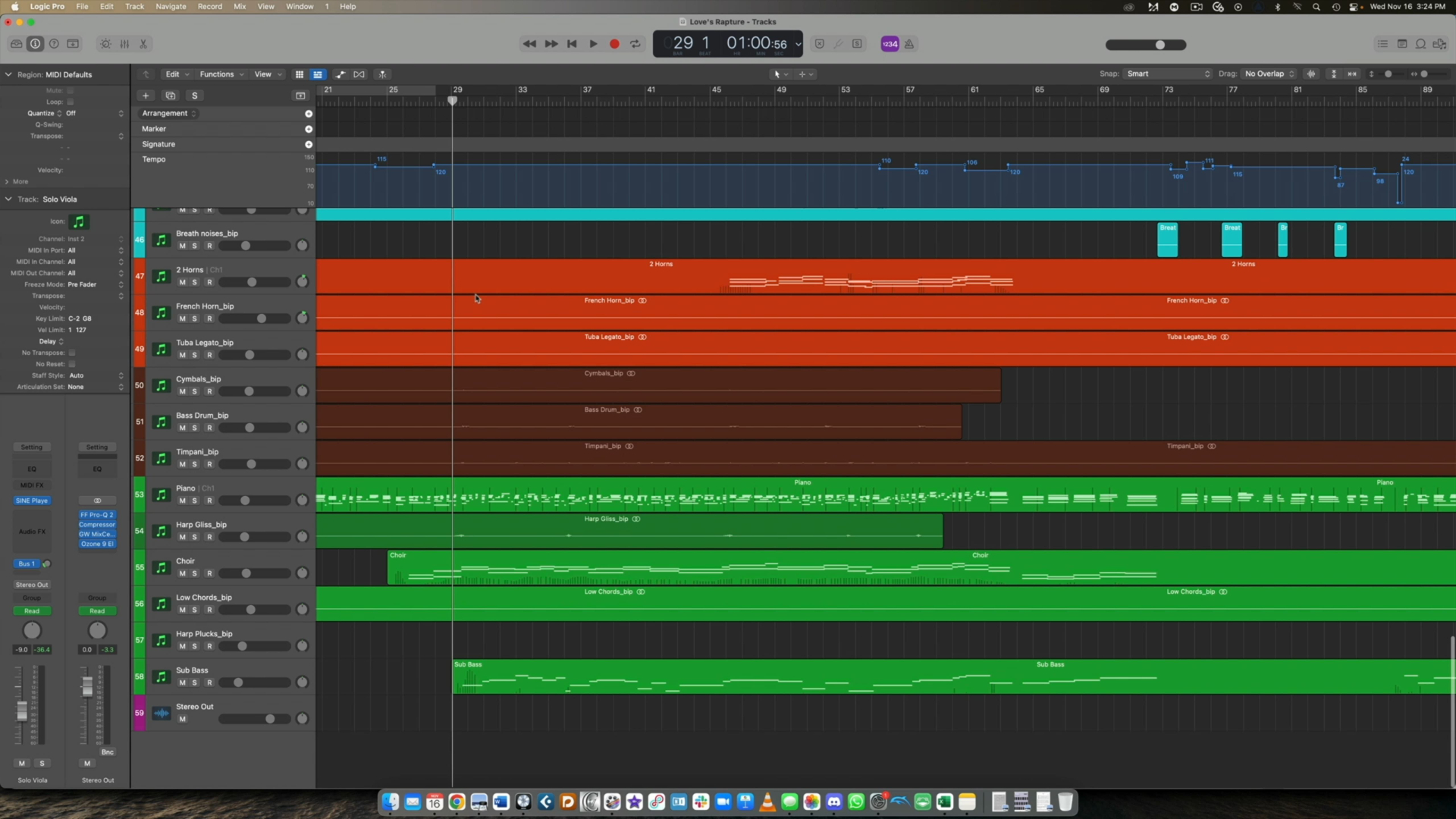
Bonus 2 - The 'call and response' method ($50 value)
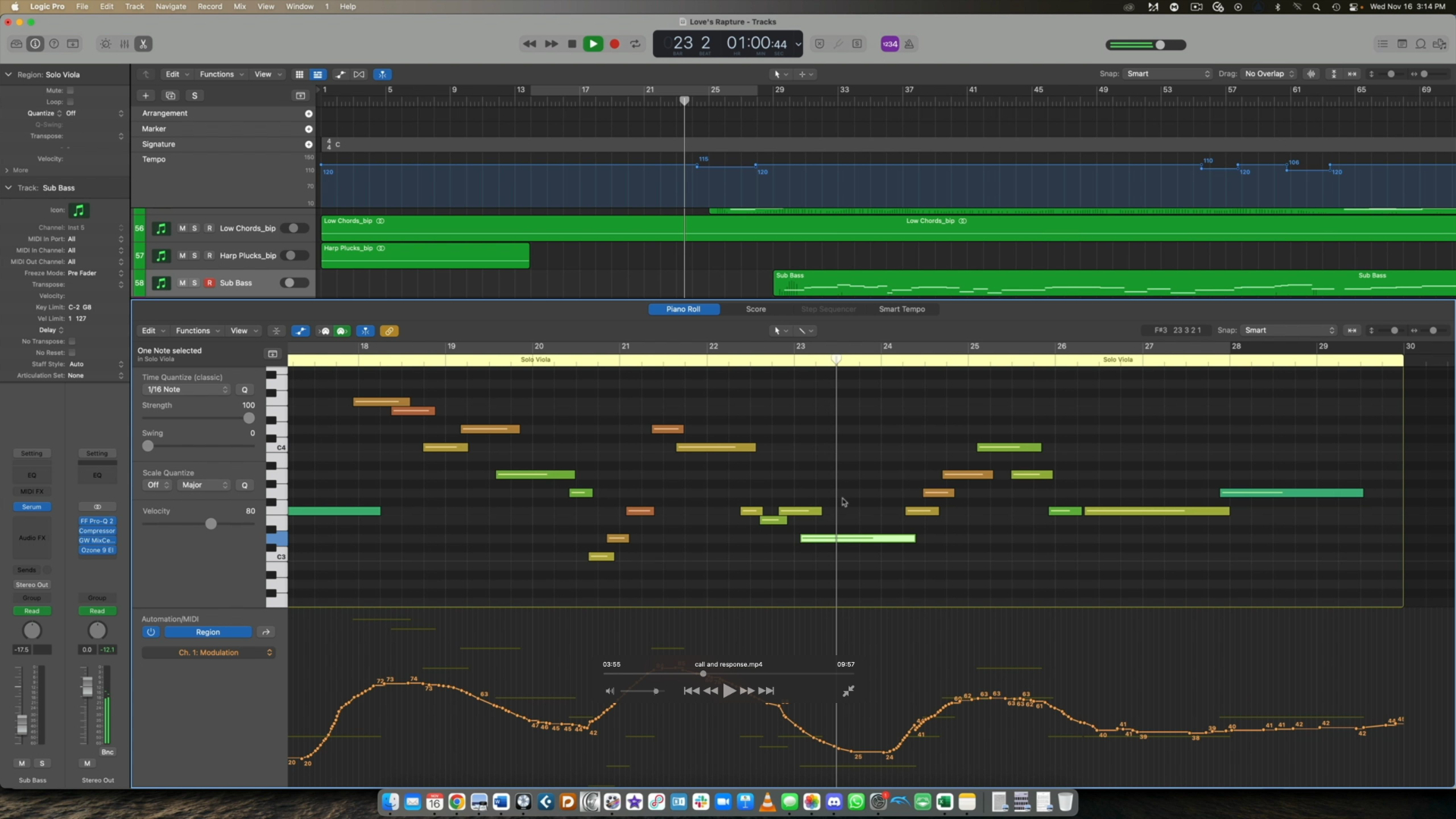
Bonus 3 - Re-orchestration: Taking an existing piece and adding my own instruments ($100 value)
In this special video I'll walk you though:
· Why balance is so important to maintain the overall flow and feel of the piece
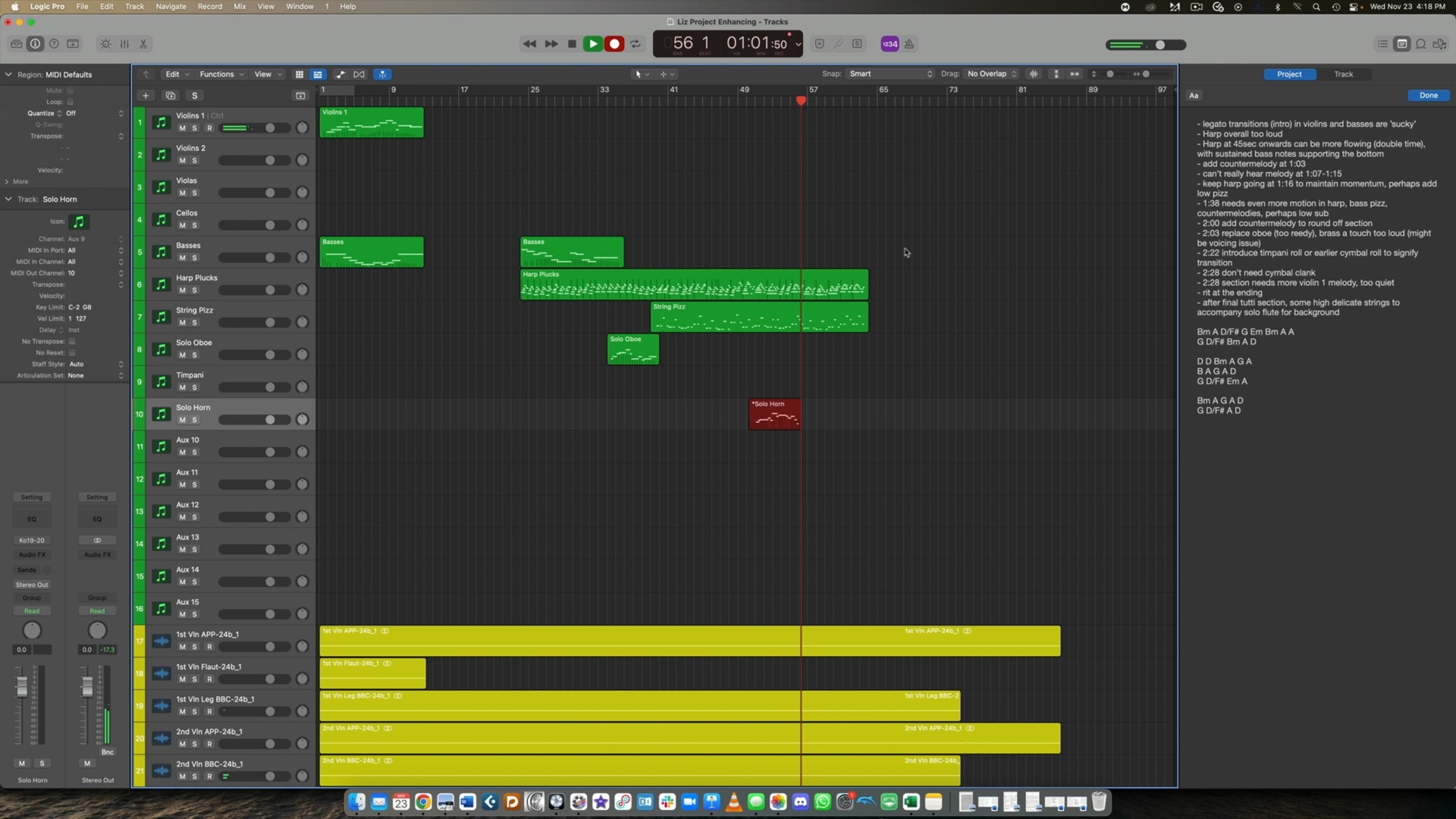
Bonus 4 - How to EQ orchestral instruments ($50 value)
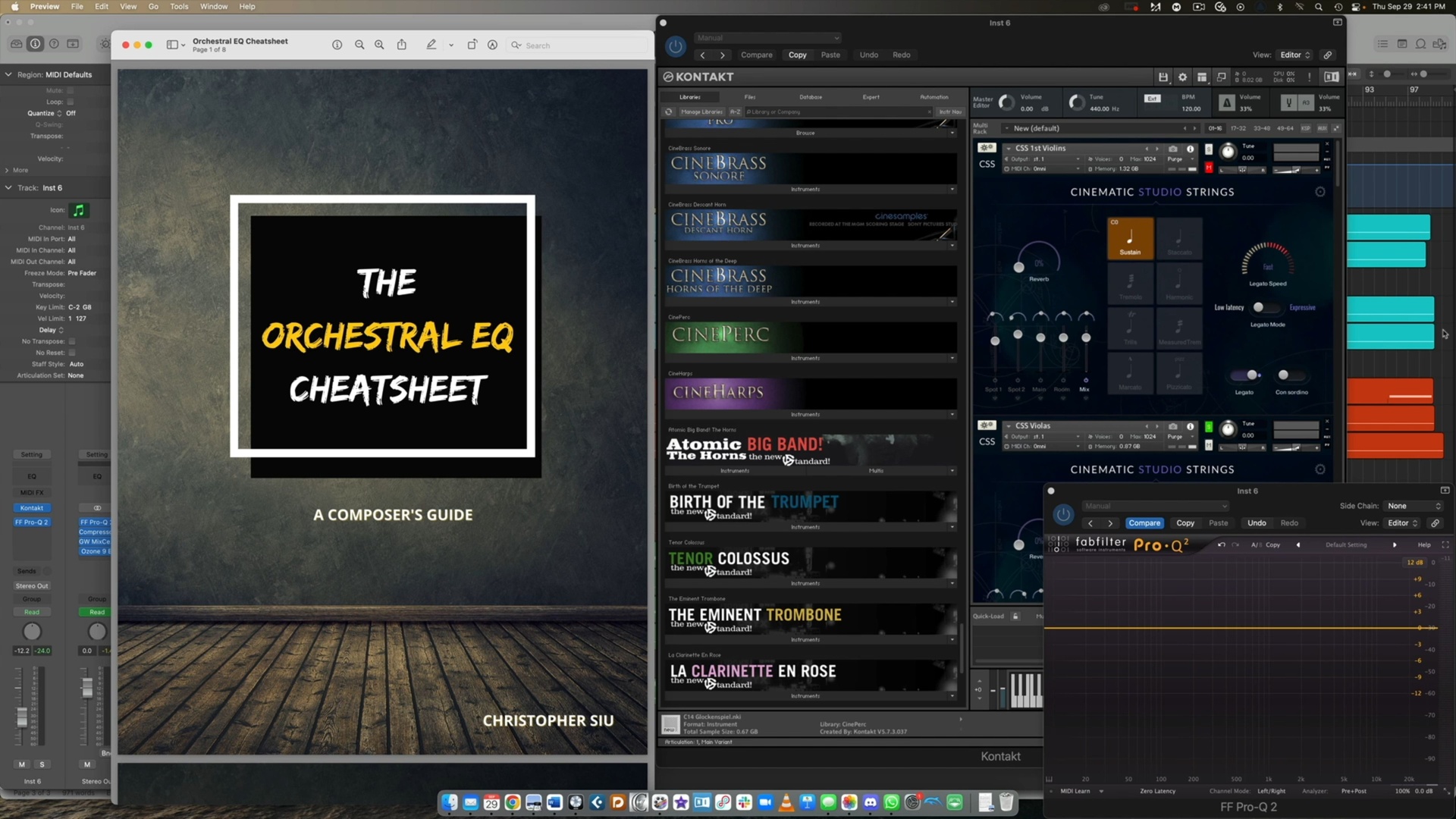
Bonus 5 - MIDI file and multitracks to 'Call To Adventure' ($50 value)

"I highly recommend Virtual Orchestration Mastery! After struggling to improve my orchestration skills with self-study, I decided to enrol in this course. It’s exactly what I needed!
What I appreciated most was Chris’ attention to detail in designing and sequencing the curriculum - one concept building on the next. Chris also demonstrates how to orchestrate a piece from start to finish. How great is that! I now feel much more confident in creating better orchestrations!
Thanks again, Chris, for all that you do and being a great teacher!"
Some common questions:
How long will I have access to the course for?
It's yours for life! Even as I continue to update the material and refine the material even further, you will receive every single update, absolutely free.
Can I access the course on any device?
Seeing as this course is based online, you can absolutely access this course on any device, as long as you have a stable internet connection.
How much money do I need to invest in equipment?
That's a great question. With technology being increasingly accessible, you can get started for as little as $300-$500 (to cover hardware/software). Again, there are wonderful free orchestral libraries out there than can get you up and running. If you already have a computer, midi controller, and a monitoring system, you can get started for absolutely nothing!
What's the difference between this and Cinematic Music Creation?
Great question! While CMC touches on general orchestration techniques and mockup tips in the live orchestration module, Virtual Orchestration Mastery goes much deeper into the science, process, and overall philosophy behind virtual orchestration. The dedicated modules on sample libraries and virtual orchestration techniques cover all you need to know about making your mockups sound realistic and musical, which is all applied when we score in various styles and our original piece, and it's highly encouraged for you to follow along with for your own piece as well.
How do I take advantage of the 40% loyalty discount for CMC?
Right after you purchase and log in to the course, you'll see the area where you can access CMC, with the 40% discount coupon that you can apply immediately.
Do I need to be able to read music to take this course?
Nope! While we will do a touch of score study (for those who prefer this approach), the majority of this course takes place in the DAW, so we'll explore all our techniques through MIDI and our sample libraries.
Is it too late to learn how to produce and orchestrate? Am I too late?
Absolutely not! I'm a strong believer that age has nothing to do with one's ability to learn or apply musical skills. I always compare it to tennis - it's a wonderful sport for any age.
So here's what you'll receive when you join Virtual Orchestration Mastery:
- All 7 core modules of the Virtual Orchestration Mastery program with nearly 20 hours of step-by-step training ($1000+ value)
- Illustrated guides and PDF worksheets to study from and reinforce what you learn ($100 value)
- MIDI files of all projects for your own study purposes ($200 value)
- BONUS: The 'call and response' method ($50 value)
- BONUS: How to avoid over-orchestrating ($50 value)
- BONUS: Orchestrating an existing piece ($100 value)
- BONUS: How to EQ orchestral instruments ($50 value)
- BONUS: MIDI file and multitracks for 'Call to Adventure' ($50 value)
Everything's total value: $1,500+
What you pay today: $397
Get access to Virtual Orchestration Mastery today for only one payment of $397!
Click the button below to get started instantly!
JOIN VIRTUAL ORCHESTRATION MASTERY"Virtual Orchestration Mastery is packed with amazing nuggets of useful information on virtual orchestration and general orchestral composition.
Chris is knowledgeable and engaging, and his practical tips for how to get the most out of your sample libraries without resorting to G.A.S (Gear Acquisition Syndrome) were especially helpful to me. He also helped me understand how to create more realistic and balanced orchstrations by demonstrating the techniques he uses in his compositions.
One particularly useful exercise is how to listen critically to orchestration and what to be aware when analyzing a musical color or texture. It helped me think differently about how to listen to my favourite orchestral pieces and consider why certain tone colours evoke different emotions. I know that I will be returning to these videos over and over again.
Overall, VOM is a valuable resource for aspiring composers who want to learn how to get the most out of their sample libraries and anyone interested in virtual orchestration in general. Highly recommended!"
- Nathan Jaquez (composer)
Prefer not to have the bonuses?
Now, if for some reason you prefer not to have the bonuses, that's totally fine! You'll still receive the core program, but simply without the bonuses and MIDI files.
- All 7 core modules of the Virtual Orchestration Mastery program with nearly 20 hours of step-by-step training
- Illustrated guides & PDF worksheets to study from and reinforce what you learn
- MIDI files of all projects for your own study purposes
- BONUS: The 'call and response' method ($50 value)
- BONUS: How to avoid over-orchestrating ($50 value)
- BONUS: Orchestrating an existing piece ($100 value)
- BONUS: How to EQ orchestral instruments ($50 value)
- BONUS: MIDI file and multitracks for 'Call to Adventure' ($50 value)
You can get the standard version of Virtual Orchestration Mastery today for just one payment of $297.
The choice is yours...
Pick whichever version of the course is right for you!
STANDARD
$297
- All 7 modules of the Virtual Orchestration Mastery program with nearly 20 hours of step-by-step training ($1000+ value)
- Illustrated guides and PDF worksheets to study from and reinforce what you learn ($100 value)
- MIDI files of all projects for your own study purposes ($200 value)
- BONUS: The 'call and response' method ($50 value)
- BONUS: How to avoid over-orchestrating ($50 value)
- BONUS: Orchestrating an existing piece ($100 value)
- BONUS: How to EQ orchestral instruments ($50 value)
- BONUS: MIDI file and multitracks for 'Call to Adventure' ($50 value)
"After the excitement of buying my first set of orchestral sample libraries faded away, I remember feeling overwhelmed. There’s just so much to understand and such a steep learning curve. From hearing pieces by experienced composers, I knew that modern sample libraries can produce stunning results, but I was so far from achieving that myself.
What makes Virtual Orchestration Mastery so helpful is that it begins from these absolute fundamentals - like the orchestral sections and instruments - before leading into the intricacies of more advanced topics, such as writing in different styles, all the way through to mixing and mastering finished compositions. There’s a LOT of material on the course and Chris presents it all very clearly, from first principles.
It’s also very practical - just yesterday I learned a new tip about using my MIDI controller that I’ll be able to use in every piece of music I write from now on. Sure, I could have spent the course fee on a fancy new VST, but ultimately that wouldn’t have made me a better composer. Virtual Orchestration Mastery was an investment I’m glad I made!"
- Richard Millington (composer)
There are 2 types of people.
Some composers dread having to orchestrate their music, because thinking about all the possibilities causes them to freeze and panic, resulting in frustration and a loss of motivation.
Other composers can orchestrate with confidence and creativity, as they understand the orchestra and what it can do to enhance their music, bringing it to life.
Which is more appealing to you?
Trust me, I've seen composers struggle with orchestration, and it's heartbreaking. It's the missing piece to the musical puzzle, where you've written some fantastic ideas, but now you need the right instrumentation to provide that colour and timbre that you're lacking!
Again, orchestration is something that composers spend a lifetime trying to master, and while I wouldn't say that you can become an overnight orchestration Jedi, if you commit to consistent practice and know the exact steps you need to take to improve, you can get there much faster than you realize.
If you truly dedicate your time and equip yourself with the resources to improve your orchestration skills for good, you'll thank yourself knowing that you committed to a critical area of music-making that others neglect, and your arrangements will speak for themselves.
Imagine a year from today...
I’d like to ask you: how would it feel to be able to orchestrate your tracks confidently and efficiently, knowing that you're achieving the musical message you're aiming for?
What would it mean for you to know that your music is moving people, not only because of your melodies and harmonies, but because the instruments and articulations you programmed are bringing those musical ideas to life?
Would it be worth it to view orchestration and programming as a fun endeavour, rather than an overwhelming obstacle?
It certainly doesn't have to be complicated - if you know me, I like to keep things simple, while achieving results using a simple, repeatable workflow.
If you're ready to commit to improving at your orchestrations once and for all, there's no better time than now to join us. I'll be here every step of the way!
See you on the inside!
Take care,
Chris
Get access to Virtual Orchestration Mastery instantly!
Click the button below to get started!
JOIN VIRTUAL ORCHESTRATION MASTERY TODAY!

- Jen Simon (composer)